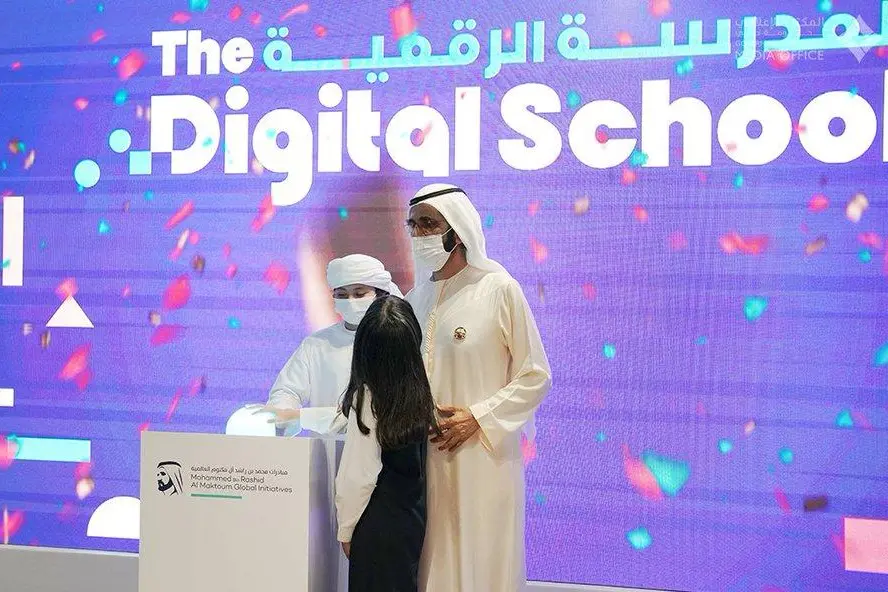PHOTO
DUBAI - His Highness Sheikh Mohammed bin Rashid Al Maktoum, Vice President, Prime Minister and Ruler of Dubai, today launched the Digital School, an initiative that aims to provide certified online education to students across the world, primarily those belonging to underserved communities.
The first comprehensive digital school established in the Arab region will provide a personalised and flexible remote learning experience to students anywhere in the world. Digital classes powered by cutting-edge technologies and Artificial Intelligence will help students enhance self-learning and skill development.
Launched under the umbrella of the Mohammed bin Rashid Al Maktoum Global Initiatives, MBRGI, the Digital School was created primarily to empower refugees and underserved students. Catering to young people irrespective of their social, economic and educational backgrounds, the School aims to reach one million students in its first five years.
The initiative’s implementation will be overseen by the ‘Alliance for the Future of Digital Learning’ that brings together specialised education and technology experts from all over the world. The Alliance’s advisory board features experts from leading global universities including Harvard, Stanford, New York and MIT.
Speaking about the new initiative, His Highness said: "We aim to provide students, especially those living in refugee camps, war zones and disadvantaged communities, with the highest quality of education in the best way possible. Digital education is the future. We need to adapt to the rapidly-changing educational sphere. Our contribution to developing educational platforms is our real investment in the future of young people."
The Digital School will blend live and self-paced virtual classes in Math, Science, Arabic, Computer Studies and English powered by interactive simulation, game-based learning, and AI-driven adaptive learning modules. Virtual classrooms will enable students to interact with their teachers and fellow learners from all over the world as well as attain a globally-recognised school certificate or credentials that will enable them to complete their university education or apply for jobs.
Using advanced learning technologies backed by learning science and artificial intelligence, the Digital School will introduce a new learning experience to students most in need. The initiative seeks to empower students living in refugee camps and marginalised communities with a rich and dynamic digital education aligned with national and global school systems. Teachers will be selected based on their research, interpersonal, organisational and leadership skills, creativity, initiative and affinity for working with young people.
In its initial phase, the Digital School will operate from November 2020 to August 2021 with 20,000 participating students in four countries, featuring three virtual classes a week over three months. The system will be further developed based on feedback and an extensive research and development process. After adjustments are made to the system, the Digital School will officially receive its first batch of students in September 2021 for the academic year 2021-2022.
The Digital School will adopt an assessment system powered by AI that supports self-learning and skill development. The School will seek digital learning accreditation from leading bodies such as Cognia, a non-profit organisation that accredits schools through the United States and internationally. It will coordinate with education ministries and relevant entities in the region to establish an accreditation model for digital education and provide curricula aligned with the national education system.
The digital credentials provided will be globally transferrable and can be added to the student’s portfolio as a proof of achievement to support future university or job applications.
The launch of the Digital School will support disadvantaged students at a time when the outbreak of COVID-19 has affected education throughout the world and forced a shift to online learning. Students in developing countries and remote areas took the biggest hit due to the lack of resources and learning alternatives provided to them.
As part of the Digital School, the first-of-its-kind ‘Alliance for the Future of Digital Learning’ was also launched to unify efforts to advance the future digital education systems in the region and the world.
The Alliance will support and develop the Digital School’s implementation across different stages to facilitate education to students across the world, particularly students living in refugee camps and marginalised communities.
© WAM (Emirates News Agency) 2020





















